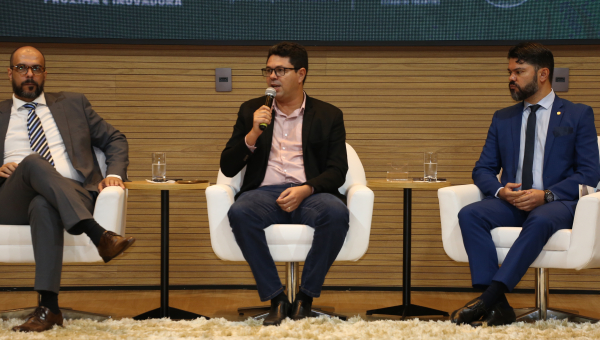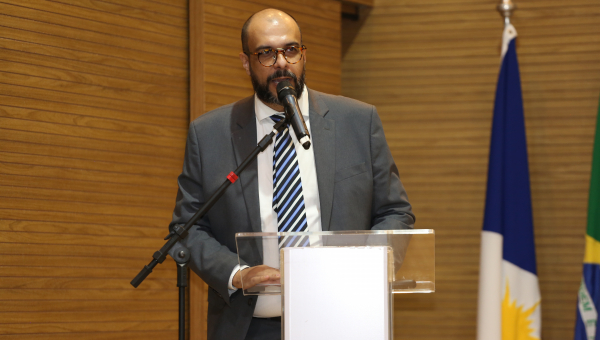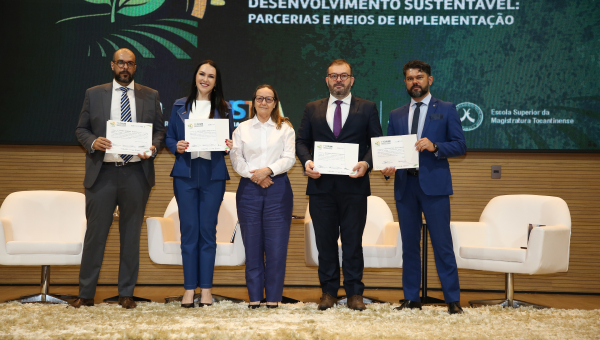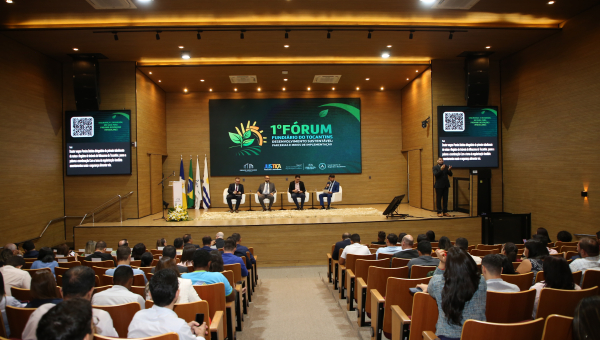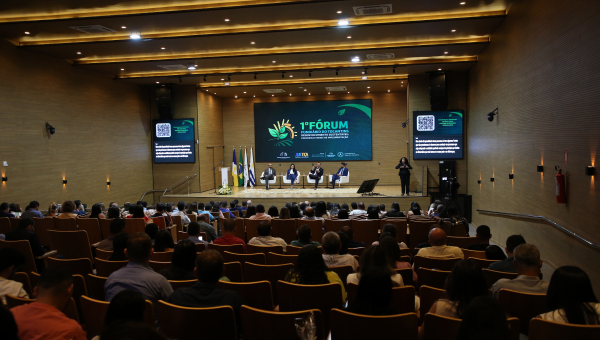
The extensive territory of Brazil, with its 850 million hectares, is the scene of deep challenges when it comes to land governance. Historical legacies, marked by land concentration and disorderly occupation, are added to current issues such as food security, social justice and environmental sustainability. It was in this context that the 1st Land Forum, held on Monday (November 25th) in the auditorium of the Court of Justice of the State of Tocantins (TJTO), brought together specialists, public managers and representatives of civil society to debate the complexities and possibilities of land regularization in Brazil and, of course, in our State.
The programming highlighted the transformative power of land regularization as an instrument for guaranteeing legal security and access to fundamental rights, such as housing and land. With lectures and real examples of successful practices, the event highlighted that regularizing land is, above all, about promoting dignity.
The role of the judiciary
Opening the programming, international consultant Richard Torsiano (FAO/UN/World Bank) presented a convincing analysis of the role of the Judiciary in Brazilian land governance. With years of experience on the subject, the speaker stressed that the contemporary challenges of regularization have deep roots, dating back to colonization.
“Without structured actions, we will continue to talk about land regularization for another two centuries. The Judiciary plays an essential role in this process, both in mediating conflicts and in modernizing registry offices and guaranteeing legal certainty. We need to tackle the root of the problem and ensure the right to land for all,” said Richard, emphasizing the potential of the initiatives in the state of Tocantins to inspire other states.
Food security
The second talk, given by Vágmo Pereira Batista, delegate of the 1st Notary Public and Property Registry Office in the district of Miracema do Tocantins, dived into the vital relationship between land regularization and food security. With alarming data pointing to millions of hungry people in Brazil, Vágmo underlined the fundamental role of small rural producers.
“These producers, responsible for 70% of the food chain of the country, support both the large and the small. They cannot be excluded from the debate. Land regularization is an ongoing process that needs to guarantee social inclusion and food security,” said the delegate.
Urban regularization
Closing the lectures, real estate registry officer Clícia Roquetto, director of Land Regularization at the Association of Real Estate Registrars of the state of Paraná (Aripar), addressed the challenges and opportunities of urban regularization in Brazil. In a speech full of provocation and hope, Clícia highlighted the barriers faced by municipalities, such as small teams, lack of structure, lack of legislative knowledge and fears about future liability.
“Reurb is a driving force for the development of the country (...). To the mayors who will take over the municipalities next year, make a commitment to the Court of Justice: make land regularization a reality. To organize the development of the municipality is to guarantee the well-being of its inhabitants,” she said.
The speaker stressed that Reurb will only be an effective instrument if all the players are committed to the same purpose, emphasizing the importance of cooperation and planning.
“In Reurb, we can do a lot, but we can't do everything. It is essential that land regularization is conducted responsibly, so that we can actually solve the problem of that population. It's important that you understand that land regularization is not just about handing over the property registration to the occupant; it's a much broader process. It involves legal, urban planning, environmental and social measures,” said Clícia.
Mediation and debaters
Mediated by Judge Wellington Magalhães, coordinator of the Center for Prevention and Land Regularization (Nupref), the lectures were a space to share good practices, connect local experiences to global debates and reinforce the importance of integrated work between the Judiciary and municipalities.
The first lecture featured Vágmo Pereira Batista and Clícia Roquetto. The second talk featured Edmundo Rodrigues Costa, regional superintendent of INCRA/TO; Aleandro Lacerda, president of Tocantins Partnerships; and Richard Torsiano. The third lecture was attended by Vânia Sousa, a lawyer responsible for land regularization in the district of Araguaína/TO; Josiene Soares Guimarães, a lawyer and president of the Land Regularization Commission at Dianópolis City Hall; and Humberto Xavier, PhD professor and president of the Institute for Attention to Cities (IAC/UFT).
On the occasion, Tocantins Partnerships paid tribute to Justice Maysa Vendramini Rosal and Judge Wellington Magalhães by presenting a plaque with the following words: TOCANTINS PARTNERSHIPS THANKS THE JUDICIARY FOR THE VALUABLE PARTNERSHIP IN LAND REGULARIZATION IN THE LAST TWO YEARS. TOGETHER, WE HAVE PROMOTED DIGNITY AND CITIZENSHIP FOR THOUSANDS OF PEOPLE OF THE STATE OF TOCANTINS, GUARANTEEING THE RIGHT TO HOUSING AND TRANSFORMING LIVES.
The First Land Forum, promoted by the General Internal Affairs of Justice of the State of Tocantins (CGJus) in partnership with the Superior School of the Judges of the State of Tocantins (Esmat), not only debated the challenges of land regularization, but also offered ways to build a fairer and more inclusive Brazil. For, as Richard Torsiano summed up so well:
“Regularizing land means ensuring that every citizen has a place in Brazilian society and territory.”












